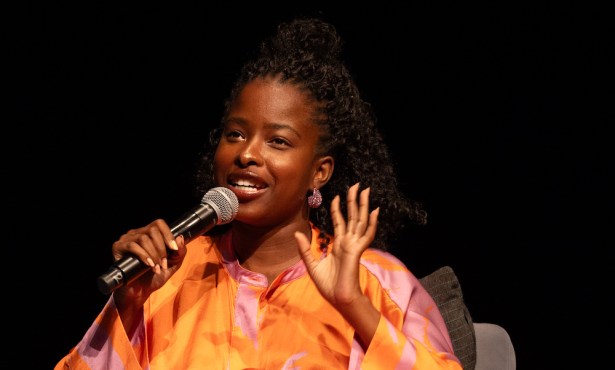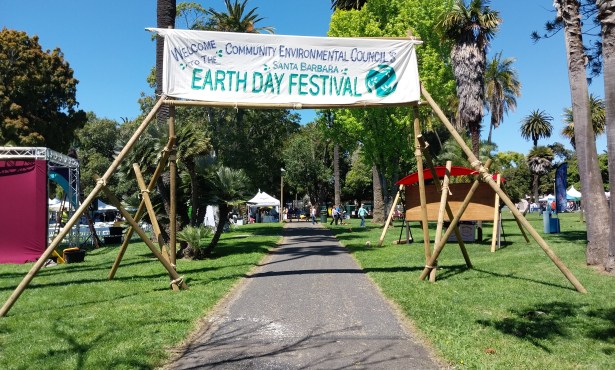Talking with Eva Marie Saint, Part II
Part-Time Montecito Resident Talks About Her First Film Role, Winning the Oscar, and Raising a Family
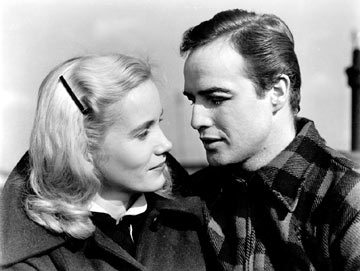
Academy award winning actress Eva Marie Saint – star of numerous Hollywood films, Broadway productions, and television shows – sat down with The Independent recently to discuss her most well-known roles. The last we spoke with her, she had traced the early stages of her career, leaving off right before she was picked to star in the timeless masterpiece, On the Waterfront.
To see the previous interview, go here.
On the Waterfront was your breakout performance. Did you audition for the part? Were you approached?
I was doing a play, Trip to Bountiful, when [Elia] Kazan saw me. That was that segue. I must have had an agent by then, but I never wanted to make a movie. During the few rounds I had made they would ask me how much I weighed, my height, and my bust size. And I thought, “This is silly. This is not for me. I want to stay in the theater.” Which I think I certainly would have had we stayed in New York.
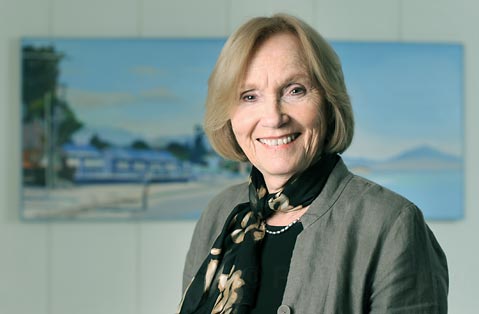
Anyway, Kazan had put Marlon and I in a room together. (I didn’t know Marlon at the time.) We were improvising, and Kazan told me, “Now, Eva Marie, you have a sister. She’s not at home, but her boyfriend is coming to visit her. Your action is to not open that door and let him in. Don’t let him in the house. You are alone.” I don’t know what he told Marlon; all I know is that he got in. He put the radio on and we started dancing. He did something to flip my skirt, and I was so embarrassed I cried a little bit afterward. It was too much, it was all too much.
But Kazan saw the chemistry, and he could see that it could work for the movie. After I was picked up I began crying and Jeff put his arm around me and said, “Honey, there’s nothing to worry about. You’re in good hands. Kazan is your director.”
How was Brando to work with?
He was wonderful. Probably the finest actor I’ve ever worked with. I think in those days he was so happy acting. I think he must have lost the joy. I mean, look what he did to his instrument, gaining all that weight. You learn that at the [Actors] Studio, by the way. That all you have is your instrument, like a musician has his instrument. You take care of it.
We were always, always rehearsing. He would be filming a scene, and while he was waiting for the lighting man and working all that out he would leave and go to another room where we were rehearsing. He would watch what we were doing, he would comment. Then we’d go back to rehearsing and he’d go back to his scene, and then we’d be up to bat. That’s how the famous glove scene happened. This is the real story:
We were rehearsing the scene, which was a difficult one: Why would I stay there and talk to this guy? I was a Catholic girl. I didn’t know about the opposite sex. And so when we were doing the scene I dropped the glove by mistake. He did not pick it up and give it back to me. He put it on that hand in very sensuous way. Kazan saw that in the rehearsal and said, “Let’s do that.” So in the scene, I drop the glove, and Marlon picks it up. I like to tell this story because it shows what a brilliant actor he was.
I only saw him once after On the Waterfron. Years later, Elizabeth Taylor was having a birthday party and he came into the room – I was so excited to see him. He came up, we hugged, and he saw a pretty young brunette over my shoulder. He said good-bye and that was the last time I ever saw him.
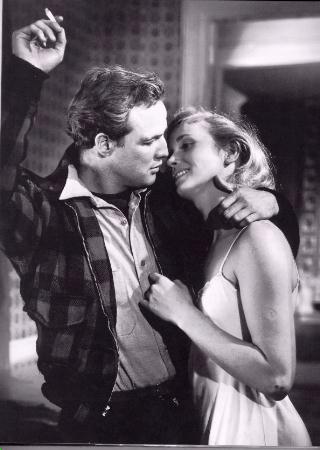
What was a little scary about him, which worked for me in the movie, was his perception of people that was so keen. He could look at somebody or talk with them and hone into what that person was all about. And he would mention it about people around us. So sometimes I would sit there and think, “If he knows that about that person, he must know more about me than I know about myself.” It made me a little self-conscious, but I used that in the movie. He’d been out in the world and I had been at home protected, so I used that.
When you were on the set, was there a sense that there was an incredible movie was being made?
Good question. People ask me that. But you just never know – you have a job to do and you do the best you can. You just don’t know until you’ve seen the film. There’s no way to know going into it that it’s going to be an Oscar-winning performance. When it happens, I realized, everyone is on the same wavelength. Everyone is working hard, working on their parts, their relationships, working with Kazan. I learned a lot from Kazan :
My first scene is on top of the tenement house with the pigeon coops when I give [Marlon] my brother’s coat. Kazan took me aside and said, “Now, Eva Marie, you’re a Catholic girl who hasn’t had much experience with the opposite sex, so this is terrifying for you.” (He would give you really specific things to think about, but I never knew what he was saying to the other actors.) He said, “Behind every pigeon coop could be a ferocious animal. I want you to remember where you are – you’ve never been on a roof like this before with a young man at night.” He went on and on, giving me all these images, but I’m thinking to myself, “You don’t have to tell me to be nervous, because I’m already so nervous.” My real nervousness actually helped the scene because the character herself was feeling the same way. I didn’t have to visualize any animals.
What else did Kazan teach you or help you with?
After I had gotten a little more comfortable on set and met everybody, I became very secure and would talk to everyone on set. He took me aside one day and said, “Eva Marie, I’ve watched you. You are friendly to everybody. You cannot do that on a movie set because, at the end of the day during your close-ups, I want you to be all there. You have to start thinking about yourself as an hourglass – you have just so much sand. When you get on a set, you have to learn how much sand you have and don’t overdo it. It takes energy to be friendly.”
There was another instance: In the love scene when [Marlon] kisses me, I was having trouble. I was in my slip. I felt a little self-conscious (as the character would be, but the actress can’t be). Kazan had met Jeff and liked him and just came over and whispered “Jeff : ” And that did it. I just made believe Marlon was Jeff.
He was the best director we ever had, I think.
What other particularly memorable moments occurred while shooting?
The whole thing was made in Hoboken, New York, and the apartment where Edie lived with her father was a real apartment. Newlyweds owned it, and they needed some extra money so they rented it out to the movie company. But after while I felt embarrassed and badly for being there – I thought they should be in their little apartment. You know, when a movie company comes in, it’s great – everyone’s excited. But after shooting there for a long time with the light and the noise and the inconvenience – I began to feel badly for them because they were out for so long.
Also, there was one close-up that Kazan needed. Jeff and I were learning how to ski and when we came home I was called in. I wore very little makeup and I put on the dress, but they couldn’t use it. I was so healthy. I was no longer the girl on the waterfront; Kazan said it was a different character.
Talk to me about winning the 1955 Academy Award for Best Supporting Actress. What was that like?
First off, there was this “feeling” between the West and the East. The West, out in Los Angeles, felt the movies made in New York were not as good as theirs, and vice versa. There was a bit of a competition going on. Anyway, we went, to be good sports, never thinking that it would win so many awards. At the time the West was much more powerful because of the money they spent on advertising. It was a New York movie. It was a black-and-white New York movie. (I was also very pregnant, and wound up giving birth two days later.)
Anyway, during the ceremony, someone from the movie won, then another person, then another person. Jeff turned to me and said, “Honey, my God, if your name is called, you’ve got to count 10 seconds before you stand up because you can’t run up there this pregnant.” If you ever see footage of me – when they announce my name – you can see me pause and wait a moment. (Jeff had his thumb on my thigh; I couldn’t get up.) So I slowly walked up and said something like, “I’m so excited I might have the baby right here.”
Well, that was a lot for someone to say in those days. Most people just said thank you, and walked off the stage (which I kind of loved.) It’s gotten a little out of hand these days, where people have to be funny and go on and on and on. You are being awarded for something you did, what you achieved, not for you or your personality. I think it’s just showing off.
Moving on to your role in North by Northwest. How did you score that part?
I had a wonderful agent at the time, Kurt Frings, who was the agent to Elizabeth Taylor and Audrey Hepburn. He was wonderful. He was Old Hollywood. He told me that Hitchcock wanted to have lunch with me, so I called my mother (who had never read a movie magazine; I don’t know where she got this) and she told me that he liked women in beige and white gloves.
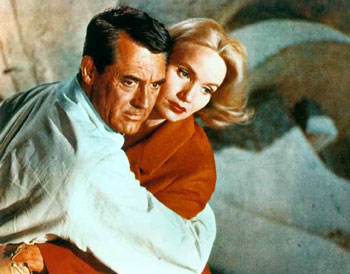
I wore the outfit, and had a wonderful luncheon with him and his wife, Alma. He was charming and lovely, and by the time I got home the agent had called me and told me I had the part. When we finished the movie he made me promise him one thing: He made me promise that I wouldn’t do any more “sink-to-sink” movies. In reference to Waterfront where I look a little drab, he said, “Women want to get out of the house and see a movie with a heroine that looks the way they’d like to look. They don’t have the clothes, the hairdo, the jewelry; they fantasize and have a wonderful time.” I told him I couldn’t promise anything, because I take parts that I like, not by how I’ll look.
Hitchcock was a high-class guy. He always had a suit on. Can you believe the whole crew wore suits? I’ve never seen it before or after. During shooting, I was drinking coffee out of a Styrofoam cup and he said, “What are you doing?! Drinking coffee out of a Styrofoam cup in that beautiful dress? Somebody get Ms. Saint a china teacup!” But he was right, because I was stepping out of character.
He wasn’t from the studio, and didn’t give much direction except to say, “Don’t use your hands, lower your voice, and look at Cary at all times.” Those were the three things he gave me to do. But because of that I was able to conjure up the type of women he thought she was. I’d never known a spy lady, but who doesn’t want to be a spy lady? The things that he gave me worked to make the character. He cared about what his leading ladies wore and what their hair looked like. He didn’t like the clothes MGM had given me for the movie, so he took me shopping at Bergdorf Goodman. I called him my sugar daddy after that. He also had a woman go all over Chicago looking for a ruby for one of my necklaces.
What was the great Cary Grant like?
Adorable. Larger than life, in a sense. He would say all sorts of funny things about himself when he was being interviewed, like, “I’d like to know who Cary Grant is myself.” He was very generous. As an actor, he was almost unappreciated. When someone can do something so easily, people don’t quite realize what he’s doing. He never got an Oscar, because he made it seem so easy that people didn’t think he was acting.
An example of him being very generous: He had in his contract what the wattage of the lights could be so he wouldn’t squint. (He also had a very dark makeup stain he would use to make himself look tan. Everyone knew that, and he’d be the first to admit it.) But working with someone who had a fair complexion, like me, was difficult in order to strike a balance. One day we were shooting and he saw me squinting, so he told the lighting man that he’d like to take the wattage down, saying it was a little too bright for him. He didn’t say it was for me. It was very sweet.
Also, when you’re on set, the still-man is taking photos all the time, and afterward you see them and get rid of the ones you don’t want. I didn’t have that in my contract yet. We’d go over the photos together, and if there was one of me not looking so good (even if he looked great) he would kill it. That’s the kind of man he was.
I know you made a conscious decision to take a break from your busy acting schedule to raise a family. Can you tell me more about that?
My agent was great but he wanted me to do too much work when I had two young children. I would turn things down, and he would tell me that I would never be a super-superstar if I didn’t work more. So I said, “I guess I don’t want to be a super-superstar.” I want to continue working, but my family always comes first. And that’s how I’ve always felt.
So when I did things like Exodus, which was three months in Europe, I would bring the whole family. When I was talking to Otto Preminger about whether I would do it, I said, “I have a two-year-old and five-year-old, and I can’t leave them at home. I would like my husband to come, so he can help me with them, and I would like my mother and father to come and help as well, and I would like my mother-in-law to come and be there when my folks get tired.” He said, “Well, I guess you have your own Exodus, don’t you?” But he agreed to all of it.
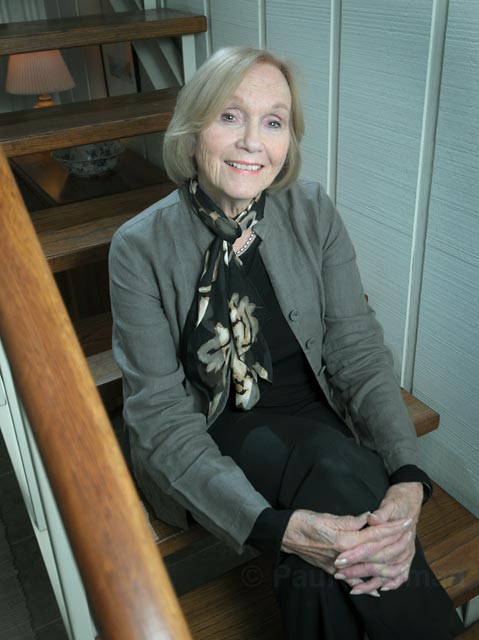
I’ve heard again and again that acting is a profession of rejection. Talk to me about that. Did you ever consider hanging up your hat after losing out on a coveted role?
One of the first things I read for was Mr. Roberts with Hank Fonda. I got the part, the only part for a woman with all these terrific guys – it was too good to be true. We were out of town (in those days you went out of town to test the show before you took it to New York) and Josh Logan, the director, called me onstage before we opened. He said, “Eva Marie, this is going to be a big hit, but we’re nervous with you. We want to replace you, but would you stay on as understudy?” I said, “Yes,” but what I was really thinking was, “I’m not going to cry in front of Josh Logan, because I’ve never felt this way before in my life.”
I walked off the stage and into my dressing room, and I couldn’t stop crying. Everybody came to check on me, one by one. (If you’ve ever seen the movie, there had to be 20 guys.) They said, “Look at the bright side. This is happening to you when you’re young. It’s happened to all of us. And it’s going to happen. This is a profession of rejection, and you have to be able to take it. And thank goodness it happened to you young.” It wasn’t until years later when I read Hank Fonda’s book why I was fired. I was fired because I looked too innocent. People in the audience, they felt, worried about me. They didn’t feel like I could hold my own; I didn’t have an edge.
I never wanted to feel that way again. I got on the subway and made my way home to Flushing, New York. When I got on I made a promise to myself that by the time I got off I would have made up my mind whether I wanted to continue in this profession, or teach. This is what my thought was: “I never want to feel this way again, because if I do, it’s going to kill me. I won’t be able to handle it. I won’t have a life to call my own. I realized that I can be disappointed from my neck up, but I never want to feel this way in my heart again.” By the time I got to Flushing, I had made up my mind to continue attempting to be an actress, but I would never ever allow it to get to my heart. And I’ve been rejected, and it never has since. I knew I was not strong enough to handle it if I allowed it to get to my heart.
What’s acting like for you nowadays? Are you satisfied with the roles you are offered and have taken?
Recently, I saw something that Angela Lansbury said – we’re just about the same age and we did All Fall Down together. She said that as you get older and older, it gets harder to find roles. And people tend to write older people as handicapped or neurotic; they just don’t write for older people. She said she wouldn’t do those roles. “Other actresses will do those roles,” she said, “and they’ll do them very well. But I chose not to do those roles.”
When I saw her recently I quoted her verbatim. She said, “How did you do that?” I replied that I felt the exact same way. I don’t mean to sound cranky, but writers are compounding the bad writing out there these days. They don’t know about Tennessee Williams or Eugene O’Neill. They just don’t know about the people that wrote those wonderful roles. But I’m not frustrated, because I keep working: I’m doing Love Letters soon. And I have my family.


